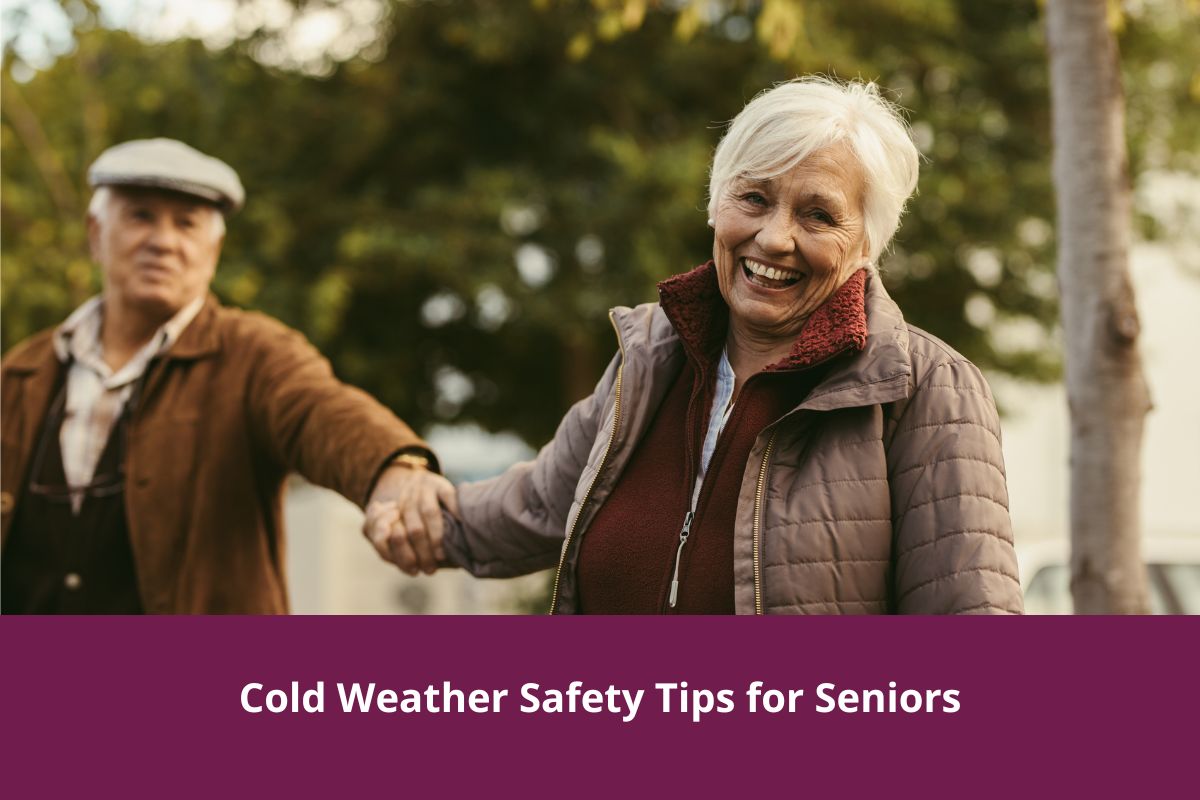Winter is here! While it rarely snows in most parts of Southern Louisiana, it’s still important to keep the safety of family members in mind, especially elder relatives.
Seniors can be particularly vulnerable when temperatures dip since their bodies are more sensitive to weather changes than younger people.
Changes in their bodies as they age may stop them from noticing a rapid temperature decrease, which in the worst case, can turn into hypothermia, which occurs when body temperature drops below 95 degrees Fahrenheit.
In addition, slippery surfaces create potential hazards outside the home and increase the risk of falls. In the US, falls are the leading cause of both nonfatal and fatal injuries in seniors. That's why it's crucial to stay extra vigilant when caring for older family members during the winter season.
In this blog post, we'll discuss how you can help your loved ones stay safe throughout the coldest months of the year. Read on for some cold weather tips for seniors about everything from keeping the house warm to consuming nutritious foods.
Keep the House Warm
Hypothermia can cause serious health problems, such as heart and respiratory failure. Since most of the time the symptoms of hypothermia can go unnoticed, make sure you pay attention to and keep track of the temperature inside the house or apartment your elderly family member resides.
You can ask your elderly family member to dress warmly and wear layers at home. Keeping a blanket nearby can ensure they stay comfortable during the winter.
Home heating solutions like central heating systems should be employed to ensure a safe indoor environment. Make sure you keep the inside temperature warm enough, at least between 68-70 degrees Fahrenheit, to keep them safe. It is recommended to check on your elderly relatives often if they live alone.
Another way to keep the house warm includes looking for areas where heat can escape, such as windows and doors, and using weatherstripping or caulk to keep the heat air in and cold air out.
Have the Heating System Inspected
Heating equipment contributed to 13% of home fires and 18% of home fire deaths in 2016-2020, according to National Fire Protection Association. If your elderly family member is living alone, be sure to have the home heating system properly inspected as soon as possible.
The best way to do this is by calling an HVAC professional to check for corrosion, build-up, exposed wires, and gas leaks that could potentially be fire hazards.
If your elderly family member uses space heaters, make sure they use them with caution. Below are some cold weather tips for seniors using space heaters.
- Purchase a heater that turns off when tipped over
- Turn off and unplug the heater before going to bed
- Never leave a space heater running unattended
Check Weather Forecasts Before Going Outside
With winter comes the potential for freezing temperatures and wind chills. This makes it all the more important for seniors to take extra precautions before venturing out into wintery conditions – namely, checking up on local weather forecasts.
Taking a few minutes to make sure that rain or extreme cold will not interfere with your plans can go a long way in ensuring winter safety and avoiding any unnecessary winter mishaps.
There are several reasons why seniors may want to check the weather report before going outside in the winter:
- Cold temperatures can be dangerous for seniors, who may be more sensitive to extreme weather conditions due to age-related changes in their bodies. Checking the forecast can help seniors dress appropriately and stay warm.
- Ice, rain, and other winter weather conditions can make it difficult for seniors to walk or drive, especially if they have mobility issues. Knowing what to expect from the weather can help seniors plan their routes and take extra precautions to stay safe.
- Seniors who have medical conditions that are exacerbated by cold weather, such as asthma or arthritis, may want to check the forecast to see if it is safe for them to go outside.
- Checking the weather report can also help seniors plan their day and decide what activities are suitable given the weather conditions. For example, if it is very cold outside, they may want to stay indoors and do low-impact exercise like yoga rather than going for a walk.
Drink Plenty of Water
Since sweat evaporates rather rapidly in cold, dry air, and cooler weather can also trick the body into not feeling thirsty, seniors may not realize that they are actually dehydrated. Drinking plenty of water in the winter is important for seniors for several reasons:
Hydration
As we age, our bodies become less efficient at retaining water. This means that seniors are more prone to dehydration. Drinking 6 to 8 cups of water helps to maintain proper hydration and prevent dehydration.
Cold and Flu Prevention
Staying hydrated can help boost the immune system and prevent colds and flu. This is especially important for seniors who may have compromised immune systems and are more prone to getting sick.
Digestive Health
Water is essential for proper digestion and preventing constipation, which is a common problem for seniors. Drinking plenty of water can help keep things moving smoothly and prevent discomfort.
Energy Levels
Water helps our bodies to maintain energy levels, especially in the winter when we may be less active. Drinking water can help seniors feel more energetic and alert.
Skin Health
Water is important for maintaining healthy skin, and seniors may be more prone to dry skin in the winter. Drinking water can help keep skin hydrated and prevent dryness and flakiness. Check out our skincare tips for seniors during colder months.
Below are some cold weather tips for seniors looking to stay hydrated this season:
- Sip smaller quantities of water more often instead of larger quantities less often to make staying hydrated easier
- Keep a reusable water bottle with a straw nearby
- Try water enhancers, pre-flavored waters, or make infused waters to make drinking water more appealing
Eat Enough Foods to Keep Energy Up
While cold weather can be enjoyable, it is also important to be aware of the need for increased nutrition in this season. For seniors, meeting the recommended daily intake of nutrients is important and can mean the difference between feeling strong and healthy or not quite one's best self.
Eating enough food to keep warm, energized, and active during winter days should be a priority for those older than 65. Opting for winter produce designed specifically to sustain full winter health, such as squash, beets, carrots, and sweet potatoes can keep your elderly loved ones strong and healthy.
These provide vitamins and minerals specifically needed during colder temperatures. In addition, elderly adults need to focus on foods containing lean protein to promote muscle building and vitamin C to boost the immune system during colder months.
Taking extra precautions for our seniors during the winter months is critical for their safety and well-being.
Keeping their house warm, checking for gas leaks, and avoiding outdoor activities when the weather is extreme are all necessary steps to make sure they stay safe during this time of year. Also, eating healthy foods and drinking plenty of fluids are vital practices that should not be ignored.
By following the tips above, we can ensure the winter season is a happy and healthy one for a senior family member. If your elderly loved one needs personal home assistance to remain comfortable through the colder months in their home, get in touch with us at Home Instead.
Our senior home care services can provide invaluable help when it comes to keeping your elderly family members safe. We always strive to ensure our senior citizens enjoy these colder months safely and securely wherever they call home. Contact us today - we are here to help!
Source:
https://www.nia.nih.gov/health/cold-weather-safety-older-adults



